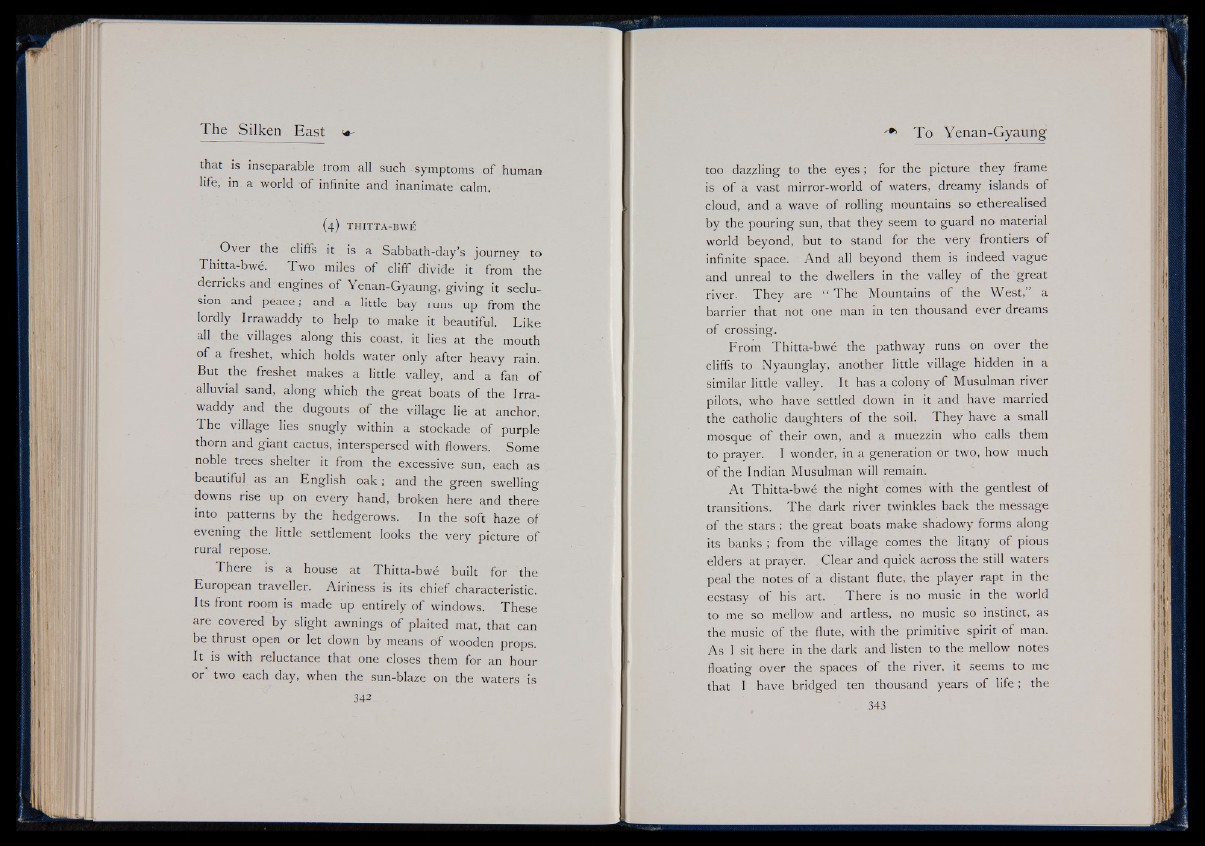
The Silken East <*--
that is inseparable trom all such symptoms of human
life, in, a world of infinite and inanimate calm.
(4 ) THITTA-BWE
Over the cliffs it is a Sabbath-day’s journey to
Thitta-bw^. Two miles of cliff divide it from the
derricks and engines of Yenan-Gyaung, giving it seclusion
and peace; and a little bay runs up from the
lordly Irrawaddy to help to make it beautiful. Like
all the villages along this coast, it lies at the mouth
of a freshet, which holds water only after heavy rain.
But the freshet makes a little valley, and a fan of
alluvial sand, along which the great boats of the Irrawaddy
and the dugouts of the village lie at anchor.
The village lies snugly within a stockade of purple
thorn and giant cactus, interspersed with flowers. Some
noble trees shelter it from the excessive sun, each as
beautiful as an English oak ; and the green swelling
downs rise up on every hand, broken here and there
into patterns by the hedgerows. In the soft haze of
evening the little settlement looks the very picture of
rural repose.
There is a house at Thitta-bwb built for the
European traveller. Airiness is its chief characteristic.
Its front room is made up entirely of windows. These
are covered by slight awnings of plaited mat, that can
be thrust open or let down by means of wooden props.
It is with reluctance that one closes them for an hour
or two each day, when the sun-blaze on the waters is
too dazzling to the eyes; for the picture they frame
is of a vast mirror-world of waters, dreamy islands of
cloud, and a wave of rolling mountains so etherealised
by the pouring sun, that they seem to guard no material
world beyond, but to stand for the very frontiers of
infinite space. And all beyond them is indeed vague
and unreal to the dwellers in the valley of the great
river. They are “ The Mountains of the West, a
barrier that not one man in ten thousand ever dreams
of crossing.
From Thitta-bwe the pathway runs on over the
cliffs to Nyaunglay, another little village hidden in a
similar little valley. It has a colony of Musulman river
pilots, who have settled down in it and have married
the catholic daughters of the soil. They have a small
mosque of their own, and a muezzin who calls them
to prayer. I wonder, in a generation or two, how much
of the Indian Musulman will remain.
At Thitta-bwe the night comes with the gentlest of
transitions. The dark river twinkles back the message
of the stars; the great boats make shadowy forms along
its banks ; from the village comes the litany of pious
elders at prayer. , Clear and quick across the still waters
peal the notes of a distant flute, the player -rapt in the
ecstasy of his art. There is no music in the world
to me so mellow and artless, no music so instinct, as
the music of the flute, with the primitive spirit of man.
As I sit here in the dark and listen to the mellow notes
floating over the spaces o f the river, it seems to me
that I have bridged ten thousand years of life ; the
343
fill
I
II
:
11
1
1J
a